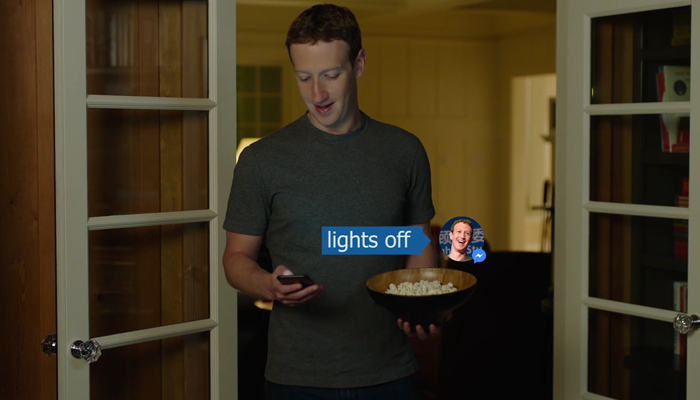Mark Zuckerberg, founder of Facebook, built an AI robot powered by Crestron hardware that can control elements of his smart home and learn his families tastes and preferences. He calls the AI robot Jarvis. After coding and designing the system, Zuckerberg wrote on Facebook that artificial intelligence is both more advanced and more limited than he anticipated.
Zuckerberg was surprised that it only took him about 100 hours to create a working robot that responds to voice or text commands and has speech and facial recognition skills. He credited the advances in technology for making the process more simplified than he originally thought.
Zuckerberg wrote the code, so multiple systems in his home can communicate intelligently. These systems include: Crestron lights, thermostat and doors; Sonos system for Spotify; a Samsung TV, a Nest cam for his dog Beast, and of course Facebook systems. He predicts in 5 to 10 years AI systems will have more accurate senses, like vision, hearing and touch, than people.
“At the same time, we are still far off from understanding how learning works,” Zuckerberg wrote. Today’s AI systems respond to pattern recognition processes, but the days when they can signal intelligent learning by taking those lessons and applying them to a brand new task are still a ways off.
Zuckerberg is proud of what he achieved with the project, and he’s willing to compare his work favorably to systems anyone can buy, like Amazon’s Echo (powered by Alexa) and Google’s Home (powered by the Google Assistant).
“It’s not a production system that’s ready to go to other people,” he stresses. “But if I couldn’t build a system that can at least do what [Echo and Home can], I probably would have been pretty disappointed in myself.”
He hastens to add that building systems like those from Amazon and Google, designed to let millions of people control a multitude of devices, is much harder than designing an AI for a single home, and that he was in no way dismissing what those companies have done. There’s also no plans to make this a Facebook product.
But, he says, “if I wasn’t able to extend what the AI could do around music recommendation or using face recognition in different ways, or understanding context as I go around the house, then I would have thought I wasn’t really pushing this forward that much.”
In fact, he said, he plans to publish a summary of what he worked on, and he’d be pleased if some of his conclusions are eventually integrated into publicly available systems. That approach reflects Facebook’s general philosophy about open-sourcing much of its work, especially in AI.
Have Questions?
If you have questions about the best way to create a smart home for your families needs, our home automation professionals can help answer any questions you may have. Feel free to contact us using the link below.
Request a Consultation



